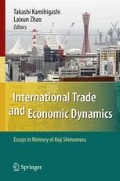Pareto proposed his well-known Principle of Compensation in 1894. However, a debate is still active concerning Pareto's own interpretation of the Principle. Did he mean that compensation should be hypothetical (feasible but not necessarily carried out) or should be carried out? It is here argued, against views to the contrary, that Pareto had in mind, the second alternative.
Access this chapter
Tax calculation will be finalised at checkout
Purchases are for personal use only
Preview
Unable to display preview. Download preview PDF.
References
Barone E (1908) Il ministerio della produzione nella stato colletivista. Giornale degli Economisti 37:267–293, 391–414. Translated in: Hayek FA (ed) Collectivist economic planning, Routledge & Kegan Paul, London, 1935
Chipman JS (1976) The Paretian heritage. Revue Européenne des Sciences Sociales et Cahiers Vilfredo Pareto 14:65–171
Chipman JS (2006) Pareto and contemporary economic theory. Rivista Internazionale di Scienze Economiche e Commerciali 53:451–475
Cordella T (1998) Patterns of trade and oligopoly equilbria: an example. Rev Int Econs 6:554–563
Fujiwara K (2005) Unilateral and multilateral gains from trade in international oligopoly, Econ Rec 81:404–413
Hicks JR (1939) The foundations of welfare economics. Econ J 49: 696–712
Hicks JR (1981) Wealth and welfare, vol 1. Harvard University Press, Cambridge MA
Jaffé W (1965) Correspondence of Léon Walras and related papers. North-Holland, Amsterdam
Kaldor N (1939) Welfare propositions in economics and interpersonal comparisons of utility. Econ J 49:549–552
Kemp MC (2008) Trade theory: a critical review. Routledge, London
Kemp MC, Pezanis—Christou, P (1999) Pareto's compensation principle. Social Choice Welfare 16:441–444
Kemp MC, Shimomura K (2001) Gains from trade in a Cournot—Nash general equilibrium. Jpn Econ Rev 52:284–302
Kemp MC, Shimomura K (2005) Price taking in general equilibrium. Am J Appl Sci (Special Issue):78–80. Reprinted in: Kemp MC (2008: Chap. 24)
Kemp MC, Wan HY Jr (1993) The welfare economics of international trade. Harwood Academic, Chur, Switzerland
Kemp MC, Wan HY Jr (1995) On lump sum compensation. In: Moore JC, Riezman R, Melvin JR (eds) Trade, theory and econometrics: essays in honour of John S. Chipman. Routledge, London
Kemp MC, Wong K–W (1995) The gains from trade when markets are possibly incomplete. In: Kemp MC, The gains from trade and the gains from aid, Routledge, London
Pareto V (1894) Il massimo di utilità dato dalla libera concorrenza. Giornale degli Economisti 9: 48–66. Translated in: Chipman JS (ed) Collected papers of Vilfredo Pareto in mathematical and quantitative economics, vol II, Academic Press, San Diego (forthcoming)
Pareto V (1895) Theoria matematica del commercio internazionale. Giornale degli Economisti 10: 476–498. Translated in: Chipman JS (ed) Collected papers of Vilfredo Pareto in mathematical and quantitative economics, vol II, Academic Press, San Diego (forthcoming)
Pareto V (1897) Cours d'economie politique, vol II. Rouge, Lausanne
Pareto V (1909) Manuel d'economie politique, Giard and Brière, Paris
Pareto V (1913) Il massimo di utilità per una collecttività in sociologia. Giornale degli Economisti & Rivista de Statistica 46:337–341. Translated in: Pasinetti LL (ed) Italian economic papers, vol I, Società editrice il Mulino and Oxford University Press, Bologna
Pareto V (1916) Trattato di sociologia generale, 2nd edn. Barbera, Firenze. Edited in English translation by Livingston, A (1935) under the title The mind and society, Jonathan Cape, London
Schumpeter JA (1949) Vilfredo Pareto (1848–1923). Quar J Econs 63:147–173
Scitovsky T (1941) A note on welfare propositions in economics. Rev Econ Stud 9:77–88
Wan HY Jr (1997) A note on compensation schemes. Jpn Econ Rev 48:147–155
Author information
Authors and Affiliations
Corresponding author
Editor information
Editors and Affiliations
Rights and permissions
Copyright information
© 2009 Springer-Verlag Berlin Heidelberg
About this chapter
Cite this chapter
Kemp, M.C. (2009). Vilfredo Pareto's Principle of Compensation. In: Kamihigashi, T., Zhao, L. (eds) International Trade and Economic Dynamics. Springer, Berlin, Heidelberg. https://doi.org/10.1007/978-3-540-78676-4_34
Download citation
DOI: https://doi.org/10.1007/978-3-540-78676-4_34
Publisher Name: Springer, Berlin, Heidelberg
Print ISBN: 978-3-540-78675-7
Online ISBN: 978-3-540-78676-4
eBook Packages: Business and EconomicsEconomics and Finance (R0)

